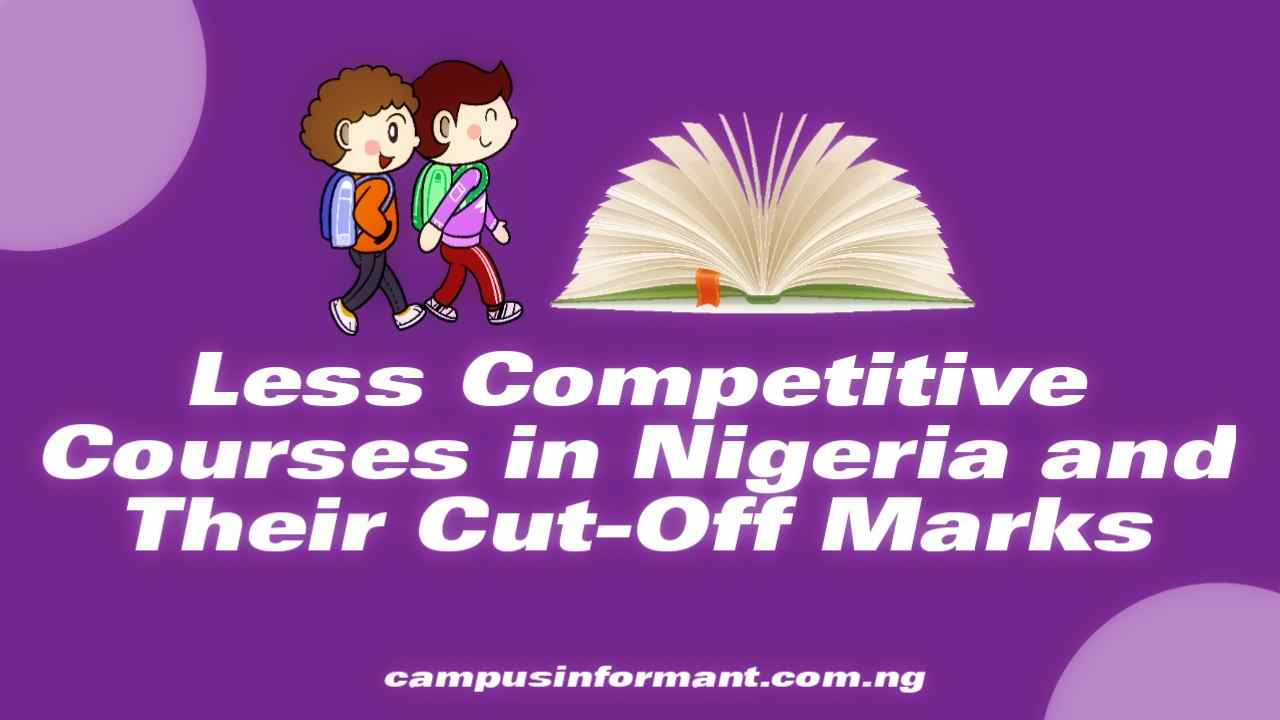2025: Less Competitive Courses in Nigeria and Their Cut-Off Marks (Science, Art, Commercial): The Joint Admissions and Matriculation Board (JAMB) has officially set the minimum cut-off mark for admission into Nigerian universities at 150 for the 2025 academic session.
This was announced during the annual JAMB policy meeting held at the Bola Ahmed Tinubu International Conference Centre in Abuja. The meeting involved key stakeholders from across tertiary institutions in Nigeria and was aimed at reviewing the previous year’s admissions and setting guidelines for the new one.
Here’s a quick breakdown of the approved minimum cut-off marks for different institutions:
- Universities: 150
- Colleges of Nursing: 140
- Polytechnics, Colleges of Education, and Agriculture: 100
JAMB also made it clear that there is no single national cut-off mark for all institutions or courses. Instead, schools are allowed to set higher cut-off marks for specific programmes based on their internal standards provided they don’t go below the national benchmark.
Now, let’s look at some less competitive courses in Nigeria that accept scores between 140 and 200, grouped by discipline. These courses are easier to get into compared to competitive ones like Medicine or Law, making them a great option for students with lower JAMB scores. Please the note that the this is just our own opinion and advice, you are always advise to make more research on about specific cut-off mark from your institution of choice.
A. Art Courses (Cut-Off Range: 140–200)
Arabic Studies
Learn Arabic language, literature, and Islamic traditions.
Archaeology
Study ancient cultures through artefacts, monuments, and ruins.
Music
Focuses on the study of sound, rhythm, instruments, and voice. Students learn music theory, composition, performance, and the cultural role of music in society. It prepares you for careers in teaching, performance, production, or music management.
Creative Arts
Learn creative expression through painting, drawing, and sculpture.
Library and Information Science
Manage information systems, organise resources, and work in libraries.
Tourism Studies
Focuses on the travel and hospitality industry. Students learn about managing tourist destinations, travel planning, customer service, and how tourism impacts culture and the economy.
Archaeology and Heritage Studies
Explores the history of human civilization through artefacts and ancient sites. It also teaches how to preserve and protect cultural heritage for future generations.
B. Commercial Courses (Cut-Off Range: 140–200)
Arabic Studies
Learn Arabic language, literature, and Islamic traditions.
Religious Studies
Explore Christian faith, teachings, and church history.
Insurance
Understand risk management, policy creation, and financial security.
Taxation
Learn about tax laws, financial planning, and revenue management.
Criminology and Security Studies
Study criminal behaviour, law enforcement, and safety strategies.
Library and Information Science
(Also listed under Art): Manage and organise information systems in academic and public libraries.
Banking and Finance
This course focuses on money management, banking operations, investment strategies, and financial planning. Students learn how financial institutions work and how to manage funds for individuals, businesses, and governments.
C. Science Courses (Cut-Off Range 140–200)
Fisheries
Learn about fish farming, aquatic life management, and food production from water resources.
Agricultural Science
Focuses on crop and animal production, soil science, and sustainable food systems.
Home Science
Study food, nutrition, wellness, and how to manage family resources effectively.
Animal Science
Explore animal breeding, biology, care, and livestock production.
Botany
Delve into plant life, growth patterns, structures, and their uses.
Anatomy
Understand the structure of the human body important in health and medical fields. In some top universities the cut off mark might go above 200
Aquaculture and Marine studies
Focuses on ocean ecosystems and organisms that live in saltwater environments.
Zoology
Study animals, their habitats, behaviours, and classification.
Food Science and Technology
This course focuses on the study of food processing, preservation, safety, and nutrition. Students learn how to develop and improve food products, ensuring they are safe, nutritious, and suitable for consumption.
Recommended Articles
Concussion
- UNN Marketing Requirements for Admission & Cut-Off Mark 2025/2026
- Estimated Payments, hostel accommodations Expenses for UNN First-Year/Newly Admitted Students
- Sterling Bank Miva Open University Scholarship 2025 for Nigerian Students
- UNN & UNEC Departmental Uniform Dress Code 2024 (Updated)
Choosing a less competitive course can be a smart move especially if your JAMB score doesn’t meet the high cut-off mark of highly sought-after programmes like Medicine and surgery, Law, Nursing, Mass communication and so on. These courses offer good career opportunities and are recognized across various institutions in Nigeria and beyond.
Also Note that the exact name of some of these courses might differ in some institutions, so make sure you find out the real name of the course in the institution of your choice.
Secondly, Make sure to also check the specific cut-off mark set by your chosen school, as institutions may raise theirs above the national minimum.
Thirdly, this blog information is only for information purposes and not representing any institution’s cut-off mark. We use the application data to track how competitive or less competitive these courses are.
If you have any questions you can let us know through the comments section below


Please I scored 202 in my jamb and I want to study mechanical engineering in University of Nigeria Nsukka is that possible
Possible but little difficult cus of you score
Attention: Get the latest SCHOLARSHIP and SCHOOL Updates on WhatsApp.
👉 CLICK HERE TO JOIN NOW!
Can 192 gain me admission in theater art?
If you have a good O’level result, but Ur chance is on the average.
Good luck
Attention: Get the latest SCHOLARSHIP and SCHOOL Updates on WhatsApp.
👉 CLICK HERE TO JOIN NOW!
Attention: Get the latest SCHOLARSHIP and SCHOOL Updates on WhatsApp.
👉 CLICK HERE TO JOIN NOW!
Can 245 go for nursing
In which university?